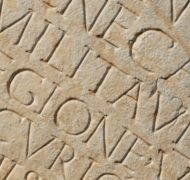Introduction to Isaiah
Bible Commentary / Produced by TOW Project
The Prophet Isaiah received a vision of God — of his great power, his glorious majesty, and his purifying holiness. Glimpsing God’s majesty led him to a humble view of himself and his society. “Woe is me! I am lost, for I am a man of unclean lips, and I live among a people of unclean lips” (Isaiah 6:5). When we glimpse who God is in Scripture, it can cleanse away our inflated self-importance and the insufficiency of our lip-service in worship. But it also can give us a clear picture of what is truly valuable in this life. It changes the way we live, the way we do business and the way we worship. When we understand who God is and where we stand in relation to him, we come out different people in our values and our work ethic.
In particular the book of Isaiah gives a clear, and at times a frightening, picture of God’s expectations of leaders. In a sense, it is an extended — and mostly negative — performance review of the kings and other leaders of Israel and Judah.[1] Modern workplaces differ significantly from those in ancient Israel. For example, the leaders seen in the book work in the government, military or religious spheres, but many of today’s leaders work in corporate, entrepreneurial, scientific and academic institutions. Yet the writing of Isaiah can be applied to today’s world if we understand what this book meant in its original setting, and we work out principles that apply to the workplace today. Moreover, in Isaiah’s view, the way we work today has value and meaning in the New Creation that God promises for his people.
God's Assessment of Israel and Judah (Isaiah)
The bulk of the book of Isaiah consists of the prophet Isaiah giving voice to God’s assessment of Israel’s failure to live up to the covenant between God and Israel. Isaiah is the first of the major Old Testament “writing prophets” — those whose prophecies are written in books titled with the name of the prophet. Some knowledge of the book of Deuteronomy is necessary in reading the prophets because the failing grades God meted out to Israel’s and Judah’s leaders must be understood in light of the covenant embodied in the Law of Moses. Through Moses, God entered a covenant with his people. He promised them security, peace and prosperity, secured by his presence among them. They promised him worship and observance of the law he gave them. Isaiah, like the other writing prophets, proclaims the people’s — and especially the leaders’ — failure to obey God’s law. It is not incidental that Jews of Jesus’ day often summarized the Old Testament succinctly as “the Law and the Prophets.” To be most clearly understood, the Prophets should be read not only within their historical setting, but also against the background of God’s covenant and law.





